
It’s becoming increasingly apparent to even the most distracted Americans that the country is falling apart economically and socially. It’s been a slow descent, but not so slow anymore. However, our problems are not merely economic. There is a shadow of social sickness enveloping the society, now becoming obvious to just about everyone. We documented this quite throughly in our previous essay, Violence and the Tyranny of Symbols.
In studying this transformative period in history, I’ve gone back to the classics for insight. As they say, “Whats old is new again.” These five non-fiction books offer some of the best insights into the challenges of our time.
1) The Culture of Narcissism (1979), by Christopher Lasch
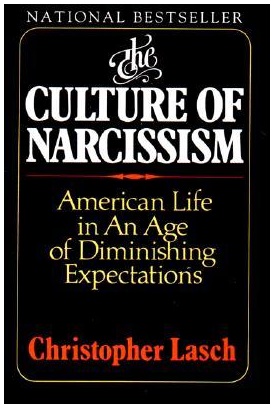 When I first picked up The Culture of Narcissism several years ago, I expected an analysis of our cultural tendency to be self absorbed — a trend which has only worsened over the last few decades. This narcissistic impulse has only been exacerbated by social media and hyper-specific forms of entertainment. But Christopher Lasch’s book is far more than just a discussion of self-centeredness.
When I first picked up The Culture of Narcissism several years ago, I expected an analysis of our cultural tendency to be self absorbed — a trend which has only worsened over the last few decades. This narcissistic impulse has only been exacerbated by social media and hyper-specific forms of entertainment. But Christopher Lasch’s book is far more than just a discussion of self-centeredness.
Lasch addresses our societal obsession with symbols, which we can see clearly in our obsession over the Confederate Flag controversy, while real injustices continue to go unchallenged. Lasch writes, “When the images of power overshadow the reality, those without power find themselves fighting phantoms.” Indeed, Americans of all political persuasions have been distracted fighting phantoms, while real problems go ignored.
Lasch also attacks the post modern “pseudo-self-awareness” which has become so common among millennials, but Americans in general as well. Today, many Americans use the internet to create a controlled image of life. Lasch describes this desire to micromanage one’s appearance as a form of post-modern art, tightly controlled and sometimes purposely defaced to offset the social pressure that might come with taking anything seriously. Americans “roleplay” the “presentation of everyday life” and detach from reality. Sadly, it’s so common now it no longer seems abnormal, but Lasch provides unique insight into it’s origin and hidden motivations.
He addresses other issues as well, including the degradation of sporting events into a heartless commercial enterprise. Overall, it’s not an easy read, but I would avoid contemporary books on the same subject. Lasch has an academic style, but his book is packed with insights you won’t find elsewhere.
2) In The Absence of the Sacred (1991), by Jerry Mander
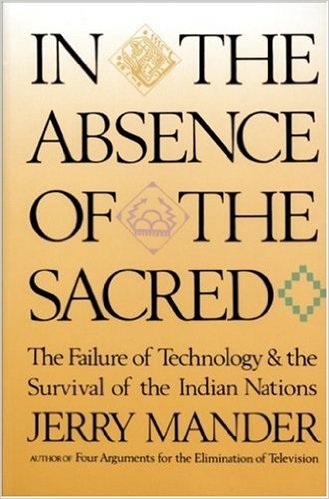 In what could be considered a direct sequel to his 1978 masterpiece, Four Arguments for the Elimination of Television, Jerry Mander broadens his criticism to the destructive nature of corporate power.
In what could be considered a direct sequel to his 1978 masterpiece, Four Arguments for the Elimination of Television, Jerry Mander broadens his criticism to the destructive nature of corporate power.
In this easy to read book, Mander documents the pathological nature of corporations, decades before the now well known documentary The Corporation did the same. He writes:
“The common wisdom said that we can get corporations to behave more responsibly if the people in the corporations could be educated in better values and saving the earth and so on. This is naive. The corporate form predetermines the way corporations have to behave.”
Brilliantly, Mander juxtaposes corporations with the Native or Indian American tribes scattered around Canada and the United States. Doing so, he successfully contrasts the mechanical and anti-human corporate machine to the compassionate and understanding aspects of traditional human societies.
“Our view of Indians goes back to the debate several centuries ago in the Catholic Church over whether or not Indians were even human beings. The Church was trying to determine whether Indians had souls and were therefore worth saving, or whether they should be slaughtered or made into slaves. There was never a thought given to whether Indians had validity on their own terms. One can quickly see the analogy to nature, because right now people are beginning to talk about whether nature has validity on its own terms, rather than being in service to human beings.”
He also provides an easy to understand criticism of “progress” in general. Understanding these arguments helps to expose just how far we have to go to create anything remotely resembling a moral society.
3) Robopaths: People as Machines (1972), by Lewis Yablonsky
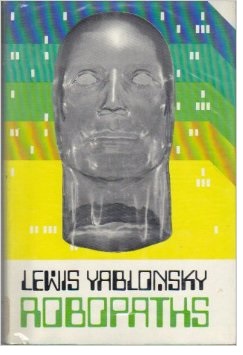 Corporations have often been compared to psychopaths, completely ignorant of morality. But corporations are made up of people, most of whom claim to be normal, caring individuals. That is what is so insidious about our current political and economic system — it gets normal people to shut down their sense of moral indignation and autonomy to serve “the machine.” There is no shortage of books claiming that the United States lead by sociopaths or psychopaths, but Yablonsky argues this is something different.
Corporations have often been compared to psychopaths, completely ignorant of morality. But corporations are made up of people, most of whom claim to be normal, caring individuals. That is what is so insidious about our current political and economic system — it gets normal people to shut down their sense of moral indignation and autonomy to serve “the machine.” There is no shortage of books claiming that the United States lead by sociopaths or psychopaths, but Yablonsky argues this is something different.
People are forced by their jobs to become like robots, or Robopaths. Unable to effectively challenge the rules of society, office workers become docile, unthinking automatons. They appear normal, but are actually suffering from a form of mindless pathology. The rules themselves become a kind of bible for behavior.
Yablonsky also writes about the dominance of “social machines” which turn people into cogs, dehumanizing them and stripping them of their moral autonomy. Even well adjusted people can find themselves utterly dominated by the will of a corporate or government social machine.
This book is rare, but it was probably the single most important text for me in my work. In addition, many of its observations are almost entirely unique and can’t be found elsewhere. You should definitely pick it up.
4) The Rebel (1957), by Albert Camus
 Albert Camus’ L’Homme révolté or The Rebel is the hardest book to read on this list by far. His writing style is logical, but often extremely verbose. That said, Camus has a lot to say about the ongoing death of meaning and identity present in western society. The Rebel is a classic of existential philosophy.
Albert Camus’ L’Homme révolté or The Rebel is the hardest book to read on this list by far. His writing style is logical, but often extremely verbose. That said, Camus has a lot to say about the ongoing death of meaning and identity present in western society. The Rebel is a classic of existential philosophy.
As our sense of identity collapses, so too does our certainty in everything else. Camus observes, “The most elementary form of rebellion, paradoxically, expresses an aspiration for order.” Indeed, there is a call to order throughout society, from our politically correct “social justice warriors,” to our right wing zealots afraid of everything and everyone — order is the sacred desire, demanded by everyone. Through order, we think, life will once again make sense.
He concludes, as do many writers who consider issues of meaning and identity, that violence is inevitable when a people have no sense of meaning and purpose. The call to rebellion cannot be satisfied unless meaning and dignity are abundant in society. He writes:
“When the throne of God is overturned, the rebel realizes that it is now his own responsibility to create the justice, order, and unity that he sought in vain within his own condition, and in this way to justify the fall of God. Then begins the desperate effort to create, at the price of crime and murder if necessary, the dominion of man.
There are a number of other observations on too many subjects to list, but if you can handle his style, it’s a worthy read.
5) The Technological Society (1954), by Jacques Ellul
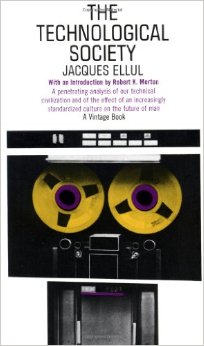 Jacques Ellul was a philosopher and Christian anarchist. Like Camus, he fought the Nazis in the French Resistance and worked to save Jews from the Nazi Holocaust. He wrote a number of different works on religion and propaganda in modern society, but his work The Technological Society is probably his most important contribution.
Jacques Ellul was a philosopher and Christian anarchist. Like Camus, he fought the Nazis in the French Resistance and worked to save Jews from the Nazi Holocaust. He wrote a number of different works on religion and propaganda in modern society, but his work The Technological Society is probably his most important contribution.
Culture is always a bit dictatorial and yet it is almost totally invisible to its host society. French philosopher Jacques Ellul helped to remove this shroud. Here he examines the motivations and ultimate goals of the technologically obsessed society.
To a modern civilization such as ours, nothing less than total control over everything that can be controlled is acceptable. To this end, we engage in “pantology” or the measure of everything. Through science, we are empowered to”eliminate or subordinate the natural world.”
“Modern technology has become a total phenomenon for civilization,” Ellul writes. “The defining force of a new social order in which efficiency is no longer an option but a necessity imposed on all human activity.” In short, this is the philosophy behind neoliberalism’s market fundamentalism. Human concerns of dignity and quality of life cannot be allowed to get in the way of growth and efficiency.
And if we resist within this paradigm, what happens to us? Ellul writes, “Not even the moral conversion of the technicians could make a difference. At best, they would cease to be good technicians.” Individual cogs are easily disposed of in the technological society because replacement ‘parts’ are widely available. In order to be a good worker, “The individual who is the servant… must be completely unconscious of himself.”
Worse, the machine described by Ellul is careful to create the illusion of freedom. “True technique will know how to maintain the illusion of liberty, choice, and individuality; but these will have been carefully calculated so that they will be integrated into the mathematical reality merely as appearances!”
The Technological Society is one of the most prophetic books on this list and has only become more true since it’s publication over 60 years ago.
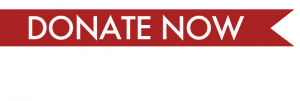
If you enjoyed this content, please donate. Even $1 or $5 makes a difference. You can donate via Paypal (see tip jar to the right) or with

